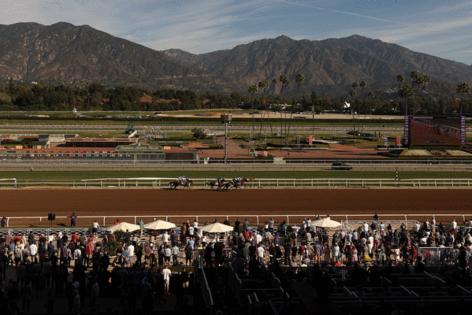What's next for Santa Anita after threat to sell the track? Could it really close?
Published in Horse Racing
LOS ANGELES — On Thursday, the California Horse Racing Board will hold its most consequential meeting in its 91-year existence. It must decide if it will allow racing to continue in Northern California based on a proposal long on hope and short on specifics. Or, if it will send that business — and simulcast money — to the south in the hope of saving the strongest part of the state's racing infrastructure.
It's as if Diogenes walked onto the set of "Sophie's Choice." Anyone have a lantern?
The owners of Santa Anita on Tuesday upped the volume when they made a not-so-veiled threat to close or sell Santa Anita if the board greenlighted the Northern California project, which would replace racing at Golden Gate with that at the Alameda County Fair. In a letter to the board, the Stronach Group said the Pleasanton proposal had a serious lack of details and should not be OKd based on "speculation."
Yet it was the Stronach Group that created this void in Northern California by closing Golden Gate Fields without discussion with its stakeholders, telling them hours before announcing it. There has also been no clarity as to what will happen to the land when Golden Gate is demolished. Lack of details seems to be de rigueur in the politics of California racing.
Here's a look at some of the questions roiling racing in the state.
Could Santa Anita actually be closed and sold?
One look from the grandstand at the snow-capped San Gabriel Mountains tells you that there are few more picturesque places in Southern California that do not include the Pacific Ocean. In other words, the land is valuable. Way more valuable than running horse races three days a week, seven months a year.
The Stronach Group is private so there is no transparency into its finances. But it's not difficult to deduce from the small crowds (despite inflated attendance figures on big days) and short racing fields that the track is struggling. Senior officials pointed to $31 million in operating losses over the last five years. All the tracks need supplemental forms of gaming income, such as Historical Horse Racing in Kentucky (slot machines pretending to be games of skill), to survive.
So, it's a very real possibility that a clear, easy, huge profit could be achieved by selling the track land to developers. The price might have a B instead of an M before the "illion" if it's sold. The finances make sense, even if it means cutting loose a part of the family business in a sport that is in serious decline in a state that offers almost no incentives to stick around.
Who is on each side of the issue?
...continued
©2024 Los Angeles Times. Visit latimes.com. Distributed by Tribune Content Agency, LLC.







Comments